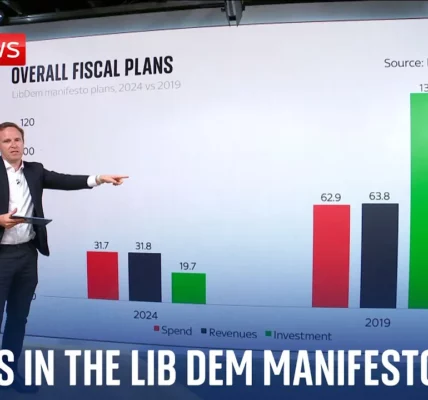Political Landscape: Pensioners, Poverty, and the Election Campaign

This article provides a comprehensive analysis of the current political climate in the UK, emphasizing the challenges faced by pensioners, the rising levels of poverty, and the strategies of various political parties as they gear up for the upcoming election.
Introduction
The political landscape in the UK is shifting as the nation prepares for its next election. Issues concerning pensioners, who have dedicated their lives to the workforce, are at the forefront of political discourse. The stark contrast between rising pensioner poverty and child poverty levels raises critical questions about government priorities and policies. It’s essential to analyze how these issues are impacting voter sentiment and party strategies as we approach the election.
The Triple Lock and Pensioners’ Financial Security
The triple lock policy, which guarantees that pension payments increase by the greater of inflation, average earnings, or 2.5%, has been a hot topic in recent discussions. This policy is perceived as a vital lifeline for pensioners, particularly in a time when many face financial struggles. However, the effectiveness of this policy and its sustainability remains a contentious issue.
Historical Context of Pensioner Poverty
Over the past 25 years, pensioner poverty has significantly decreased, thanks in part to policies aimed at protecting the financial security of the elderly. Despite this progress, many pensioners still live in poverty, raising concerns about the adequacy of support systems in place.
Statistics on Pensioners and Poverty
- Approximately 1.4 million pensioners live in absolute poverty.
- The number of children in poverty is alarmingly high at around 4.3 million, marking the highest levels since records began.
- Pensioner poverty statistics have halved over the last 15 years, indicating some progress in addressing this issue.
The Impact of Voter Demographics on Election Outcomes
Voter turnout among different age groups heavily influences election results. Data from the 2019 election revealed that only 47% of voters aged 18 to 24 participated, while those over 65 were significantly more likely to vote. Understanding these voting patterns is crucial for both major parties as they strategize their campaigns.
The Conservative Party’s Strategy
The Conservative Party has focused its messaging on appealing to the older demographic, emphasizing promises related to pensions and financial security. This approach aims to solidify their base among pensioners, who are a pivotal voting bloc.
The Labour Party’s Position
In contrast, the Labour Party has positioned itself as a champion for working families, emphasizing the need for economic stability and growth. Their plans include partnering with businesses to foster job creation and address the concerns of younger voters, who are increasingly frustrated with the current political landscape.
The Role of Campaigning in Shaping Public Perception
As the election approaches, the significance of effective campaigning cannot be overstated. Both major parties are ramping up their efforts to reach voters through various channels, including traditional media and digital platforms.
Digital Campaigning Trends
Political advertising on social media has become a critical component of modern campaigning. The Labour Party has reportedly outspent the Conservatives on platforms like Facebook and Google, indicating a strategic focus on digital outreach.
Public Engagement Events
Engaging with voters directly through public events and appearances is another strategy employed by both parties. Recent events have included speeches at local businesses and community centers, showcasing party leaders’ commitment to understanding constituents’ concerns.
Conclusion
The upcoming election will be pivotal in determining the future direction of UK politics, particularly concerning pension policies and poverty alleviation. As parties position themselves to win over voters, it is essential for them to address these pressing issues head-on. Voter turnout, particularly among younger demographics, will play a crucial role in shaping the election results. The conversation surrounding financial security for pensioners and the rising levels of child poverty must remain at the forefront of political discourse. As we move closer to election day, it’s imperative for voters to stay informed and actively participate in the electoral process.
For further insights into the political landscape and related articles, feel free to explore our related articles.
“`




